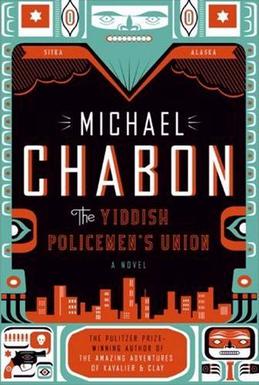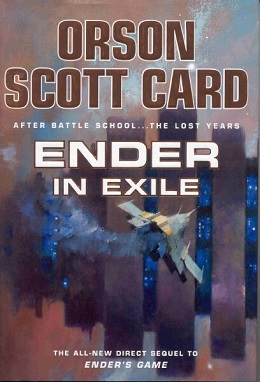[Originally posted January 9, 2009]
 I had seen this book prominently displayed at several different bookstores last year, and happened upon a couple of reviews of it which all spoke highly of it. It is a rather hard book to classify because at it’s heart it is a classic noir style detective story, but although the technology in it is not any different than what we currently have, it is set in an alternate timeline. As such, you’re most likely going to see it in science fiction sections, and indeed, it won both a Nebula and Hugo award for best novel as well as the Locus award for best SF novel. But if you’re not a regular science fiction reader, I highly suggest you pick this up anyway.
I had seen this book prominently displayed at several different bookstores last year, and happened upon a couple of reviews of it which all spoke highly of it. It is a rather hard book to classify because at it’s heart it is a classic noir style detective story, but although the technology in it is not any different than what we currently have, it is set in an alternate timeline. As such, you’re most likely going to see it in science fiction sections, and indeed, it won both a Nebula and Hugo award for best novel as well as the Locus award for best SF novel. But if you’re not a regular science fiction reader, I highly suggest you pick this up anyway.
Suppose that after WWII the state of Israel lasted only until 1948 when it was defeated its neighbors and the Jewish population was expelled from that territory. Michael Chabon imagines a world in which those Jews, and others, ended up settling in an area of Alaska which was set aside for them by the US government. An idea which is based on a little known historical fact; that the US Congress considered just such an option at the end of the war. Now, 60 years later, that land is about to revert to American control. Against that back drop, the main character, Meyer Landsman, an alcoholic homicide detective on the Sitka police force, goes about solving the murder of a man who lived in Landsman’s own apartment building.
It’s a fantastically told story, weaving elements of classic detective novels, Jewish culture, and a fully developed alternate history together seamlessly. Having just read Jonathan Lethem’s Gun, With Occasional Music which is another Chandlerian detective novel in the science fiction realm (blended with the surrealism of Philip K Dick as opposed to Chabon’s dropping his detective into a world inspired by Northern Exposure) I definitely appreciated the chance to ride along with Landsman, who yo-yos between being brilliant and exceptionally effective and being completely lost and adrift in currents of corruption, religious fanaticism and general corruption that run from Landsman’s own family, to a group of super-Orthodox Jews who have formed their own mafia and all the way over into mysterious figures in the American government. The writing is well-paced and clear, and as a reader, you never feels cheated on information, even when you aren’t familiar with certain Jewish customs and beliefs that play into the storyline as Chabon explains them quite understandably. (And he even includes a handy little glossary of various Yiddish terms which he has adapted to the unique situation of his novel. For example ‘sholem’ which means ‘peace’ is used to mean ‘gun’ as ‘peace’ is a pun on ‘piece’, which is of course American slang for ‘gun’.)
My rating: 5/5 stars
Side note, the Coen brothers are returning to their cold Fargo roots as writers and directors of a movie adaptation of the novel.

 Without a doubt, Orson Scott Card’s Ender’s Game is one of the most beloved science fiction novels of the last 30 years. The subsequent series and off-shoot series have shown Card’s ability to take both aspects — the action and the philosophy — of the original novel and expand them very well. And Ender’s Game is definitely one of my favorite novels ever.
Without a doubt, Orson Scott Card’s Ender’s Game is one of the most beloved science fiction novels of the last 30 years. The subsequent series and off-shoot series have shown Card’s ability to take both aspects — the action and the philosophy — of the original novel and expand them very well. And Ender’s Game is definitely one of my favorite novels ever. Joe Abercrombie’s The First Law is a three book fantasy series which is heavier on sword than sorcery. The basic story centers on The Union, a medieval style kingdom which is threatened on two fronts by the barbarian hordes of Northmen and the religious zealot empire to the south, Gurkhul. The main characters are the most-feared Northman warrior, Logen “Bloody-Nine” Ninefingers, a Union military officer and minor noble, Jerzal dan Luthar, a crippled Union Inquisitor (ie. torturer) Glotka, and a several thousand year old mage, Bayaz.
Joe Abercrombie’s The First Law is a three book fantasy series which is heavier on sword than sorcery. The basic story centers on The Union, a medieval style kingdom which is threatened on two fronts by the barbarian hordes of Northmen and the religious zealot empire to the south, Gurkhul. The main characters are the most-feared Northman warrior, Logen “Bloody-Nine” Ninefingers, a Union military officer and minor noble, Jerzal dan Luthar, a crippled Union Inquisitor (ie. torturer) Glotka, and a several thousand year old mage, Bayaz.
